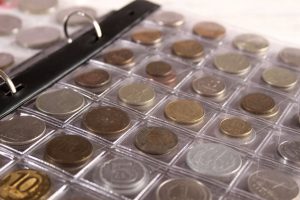Recently I learned about a popular brand of pottery I’d never heard of before called Rae Dunn. It’s sold at retailers like TJ Maxx and Marshall’s and is always in demand. People line up at stores that sell it before they open hoping to score some new pieces. There’s such a big market for these products that flippers are able to make a profit by buying the items at retail price and selling them for more than they paid.
Because I’m trying to decorate my home and like the style of Rae Dunn’s pottery line, I’m considering collecting it myself. But is building a collection of decorative items you don’t really need a waste of time and money? Here are some of the pros and cons of collecting things to help you decide if it’s worth it.
Pros of Collecting
Your Collection Could Make You Money
One potential benefit of collecting is that it could earn you money. Some items may increase in value over time, such as antiques, coins, and rare first edition books. If you plan on holding onto your collection for many years, it could appreciate in value over time and earn you a profit if you ever decide to sell it. However, it’s worth keeping in mind that you’d probably earn more by investing that money instead rather than sinking it into your coin collection.
Your knowledge of niche items can also earn you money now. If you find underpriced collectibles at garage sales or thrift stores, you may be able to flip them for profit on Ebay or Facebook Marketplace.
Sentimental Value
Many people’s collections hold immense sentimental value. Your baseball cards or coin collection may have been passed down from a parent or relative. You may have fond memories of hunting for new items with your dad, or use your comic book collection to make new friends. If collecting brings you joy and helps you feel connected to your loved ones, the expense of building and storing your collection may be worth it for you.
Cons of Collecting
Collecting Can Get Out of Control
Some people get addicted to the high of finding new items and spend more than they should on building their collections. It’s possible to take things too far and get into debt. For example, one woman said she spent $15,000 on Rae Dunn pottery in just six months.
If you’re collecting rare or in demand items, it’s important not to get too caught up in the hype. Set a monthly budget for your purchases and don’t go over it even if you find something really great. There’s always going to be something new to collect, so you have to set limits on your spending to avoid financial strain.
Takes Up Space, Time, and Money
Collecting can take up more time, space, and money than other hobbies if you’re not careful. Because collecting is all about acquiring new items, the expenses can add up, especially when compared to a free or cheap hobby like hiking.
For example, if your collection outgrows your home, you may need a storage unit for your extra items. You may also find yourself spending a lot of time building your collection, especially if you’re looking for rare or in demand items. That time may be better spent on more lucrative side hustles, career advancement, or just spending time with your family.
If you’re not careful when sourcing items, you may also pay too much for things and have a hard time recouping your investment down the line. So it’s important to set a budget for your collection and do your research to make sure the things you’re buying are a good value.
Tips for Collecting Things Without Hurting Your Finances
Although collecting can damage your finances, it doesn’t have to. Here are some tips to help you keep your spending in check so you can enjoy your hobby without financial strain.
Set a Budget
The sky is usually the limit with collecting. There’s always a new comic book or piece of pottery to buy. That’s why you need to place a hard limit on your spending so you don’t go overboard. Set a monthly budget for your purchases and don’t allow yourself to go over it. When the money is gone, don’t tempt yourself to spend by going hunting for items. Stay out of the thrift shops and don’t give into your fear of missing out on great items.
It’s also a good idea to limit the number of items you collect. You can only fit so many books or baseball cards in your apartment. Figure out how many items you can comfortably store. When you start running out of space, consider selling off some of your collection so you don’t have to live in a cluttered home or pay for a storage unit.
Buy Things With Good Return on Investment
Some collectibles hold their value better than others. Beanie babies were just a fad, but a good coin or stamp collection may appreciate over time. Try to collect items that will give you a good return on your investment if you ever need to sell them.
Don’t buy marked up items from resellers either. Hunt for underpriced collectibles at thrift stores and garage sales so you have the option to flip them for profit if you ever need to downsize your collection.
Get Out at the Right Time
If you’re collecting something trendy, keep an eye on the market so you can get out at the right time. Beanie babies were valuable at their peak, but practically worthless once the trend ended. If you’re collecting something that has the potential to be a passing fad, keep an ear to the ground so you can sell your collection before the hype is over.
Trade for New Items
If your collection is starting to feel stale, you can update it without spending any money by trading your items for new ones. Many people who collect Rae Dunn pottery will make trades to refresh their home decor at no extra cost. Just make sure the trade is fair based on the market value of the items.
Is Collecting Worth It?
Collecting may be worth it for you if you have some disposable income and it brings you joy. But if you’re racking up debt to buy new items, it’s probably time to go cold turkey and stop collecting.
I’ve decided to pick up a few pieces of Rae Dunn pottery here and there when I see it in stores. But I’m not going to snap up every piece I see like some collectors. If I can picture where I’ll put it in my home and it adds to my decor, I’ll purchase it. But if not, I’ll pass it up. I don’t want to get sucked into the hype like other collectors and end up with hundreds of dollars of pottery I don’t have room for.
What do you think—is collecting a waste of money or a good investment? Do you collect anything? Let us know in the comments section below!
Read More
4 Ways to Live More and Work Less
How Much Should You Spend on Decorating Your Home?
Why Are People Obsessed With Money?

Vicky Monroe is a freelance personal finance and lifestyle writer. When she’s not busy writing about her favorite money saving hacks or tinkering with her budget spreadsheets, she likes to travel, garden, and cook healthy vegetarian meals.
